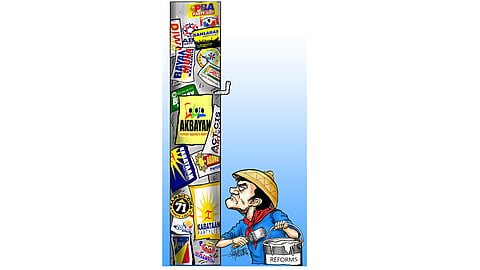
- NEWS
- the EDIT
- COMMENTARY
- BUSINESS
- LIFE
- SHOW
- ACTION
- GLOBAL GOALS
- SNAPS
- DYARYO TIRADA
- MORE

The state of the Philippine political party system has long been a topic of concern for political observers and analysts. It has been described as fragmented, personality-driven, and bereft of clear ideological distinctions.
Former Senate President Franklin Drilon’s observation about the Marcos administration’s senatorial slate, which he labeled a “hodgepodge,” underscores the deeper structural weaknesses of the country’s political landscape.
Drilon lamented that the political system is no longer built on party principles but on individual personalities, allowing the rise of opportunistic political alliances. The emergence of such slates, as Drilon argues, is a direct consequence of the Philippines’ presidential form of government coupled with a multi-party system.
At the heart of the problem lies a fundamental disconnect between the electoral process and political parties as vehicles for coherent policies and governance platforms.
Ideally, political parties should represent distinct ideologies or policy frameworks. They should serve as organizations that develop and promote a clear vision for the country’s future.
However, in the Philippines, political parties have become little more than labels used during elections, with little to no adherence to ideology. This dilution of political parties into mere campaign machines erodes democratic accountability and makes it difficult for voters to distinguish between candidates based on substantive issues.
The Marcos administration’s senatorial slate exemplifies this problem. It includes a variety of personalities from different backgrounds, many of whom are popular figures with strong name recognition but little connection to a unifying ideological stance.
This “hodgepodge” reflects the longstanding tradition in Philippine politics of building electoral alliances based on individual popularity rather than policy alignment. What emerges is a slate driven by electability, name recognition, and political convenience, often at the expense of a coherent platform or vision for governance.
Drilon rightly points out that this is a byproduct of the country’s presidential system operating in a multi-party context. In a presidential system, the focus is placed squarely on the individual running for the presidency.
Since the President does not need a majority coalition in parliament to govern, political parties have little incentive to function as cohesive entities with clear platforms. The party system, thus, becomes a mere backdrop to the personal ambitions of candidates, each of whom jockeys for position through alliances and accommodations with other political players.
This situation is exacerbated by the phenomenon of turncoatism, which has become rampant in the current political environment. Turncoatism refers to politicians switching parties, often out of convenience or to secure an electoral advantage, rather than out of any ideological conversion.
In the Philippines, politicians frequently shift from one party to another depending on which one is in power or which offers the best chance of winning. The consequence is a fluid, unstable political landscape where loyalty to party platforms is secondary to personal ambition.
The absence of anti-turncoatism laws has further weakened the political party system, allowing this behavior to continue unchecked. In many mature democracies, party-switching is viewed with suspicion and is often penalized by voters. In the Philippines, however, it has become the norm.
The weak party system has produced an electoral process that is increasingly based on name recognition rather than ideological substance. Drilon points out that popularity, not policy, drives electoral success. In every election, candidates with high-profile backgrounds, such as actors, athletes, or media personalities, often win, not because of their policy proposals, but because of their recognizability.
This is compounded by the fact that political advertising is costly, and those with access to greater resources, such as incumbent politicians or those with established family dynasties, often dominate the electoral narrative. The result is an oligarchic system in which the same names and families cycle through political positions, with little innovation or new thinking brought into governance.
Without meaningful reforms — such as anti-turncoatism laws, the strengthening of political parties, and electoral reforms that prioritize platforms over personalities — the political landscape will remain fragmented and vulnerable to the whims of individual ambition rather than the needs of the country.
